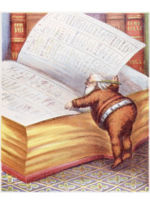Book
 From Conservapedia
From Conservapedia A book (Spanish: libro, French: livre, German: Buch, Dutch: boek, Greek: βιβλίο, Russian: книга) is a collection of written words, usually on paper but increasingly being found in electronic formats such as Kindles and iPads. The Bible is an example of a book (in fact, the word "Bible" is derived from the Greek word for "book."), as well as a collection of books. Books are often used for educational purposes in the form of text books, although there is concern about the accuracy of the information contain in some of them. Any finite collection of books can be bound together to form a new book.
The average length of a best-selling book has been sharply decreasing, falling by nearly 50% in merely seven years: in 2011, average length of a bestseller was 467 pages, but by 2017 that length had declined to 273 pages.[1] But some observe that book length has at times increased in the last quarter-century.[2]
The book was called a codex in Latin, and it was a Roman improvement over the scroll. By the fourth century the codex had gained wide acceptance, and many scrolls that were not converted to codex form were lost to posterity.
Contents
Types[edit]
Books are classified by a hierarchy. The two most general categories of this hierarchy are fiction - meaning an invented or feigned narrative (an imaginative form of narrative)[3] - and non-fiction - a composition that its authors believe to be truthful. Further types of fiction books include science fiction, historical fictions or myths. Non-fiction books would include accounts, biographies and the like.
Books can also be classified by media, such as audio or print. For example, some books are available in audio versions. An example of this is Talking Books, available through the free Talking Books Program through the Library of Congress.
Classifications and Simple Explanations[edit]
Please note that the list below is not complete.
| Fiction (untrue) | Non-fiction (true) |
|---|---|
|
|
Holy Books[edit]
One of the most notable genres is the holy book, the most notable of which is the Bible.
Parts of a Book[edit]
The main parts of a book are:
- cover with title (very important)
- epigraph (a quote or phrase for starters, and can be used at the outset of chapters also)
- forword or preface
- prologue
- afterword or epilogue
References[edit]
- ↑ https://scribemedia.com/how-long-should-book-be/
- ↑ https://www.theguardian.com/books/2015/dec/10/are-books-getting-longer-survey-marlon-james-hanya-yanagihara
- ↑ fiction (English). Dictionary.com. Retrieved on 2007-11-12.
- ↑ 4.0 4.1 4.2 Exploring the Different Types of Fiction (English). dummies.com. Retrieved on 2007-11-12.
- ↑ Folklore (English). Dictionary.com. Retrieved on 2007-11-12.
- ↑ Mary E. Brown. Realistic Fiction (English). South Connecticut University. Retrieved on 2007-11-12.
- ↑ Sue Peabody. READING AND WRITING HISTORICAL FICTION. Washignton State University.
See also[edit]
- Library of Congress
- People of the book
- Talking Books
- Torah
- Vedas
- Book of Hours
- Author
- Books on conservatism
External links[edit]
- Book Feir Guadalajara.
- Book adventure For kids.
- Talking Books Librarian Free Talking Books Program and other Library Related Resources
Categories: [Books]
↧ Download as ZWI file | Last modified: 02/14/2023 23:24:06 | 399 views
☰ Source: https://www.conservapedia.com/Book | License: CC BY-SA 3.0
 ZWI signed:
ZWI signed:

 KSF
KSF